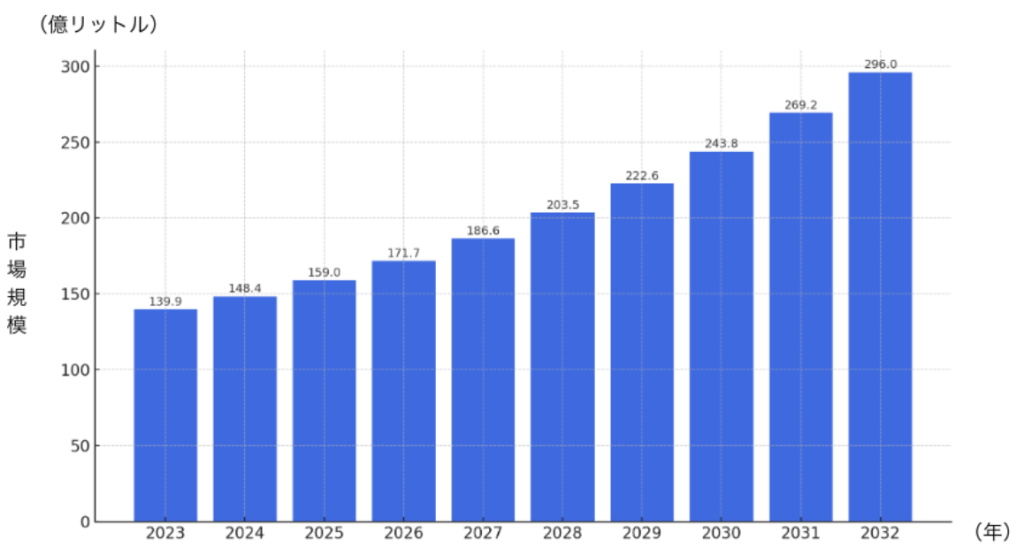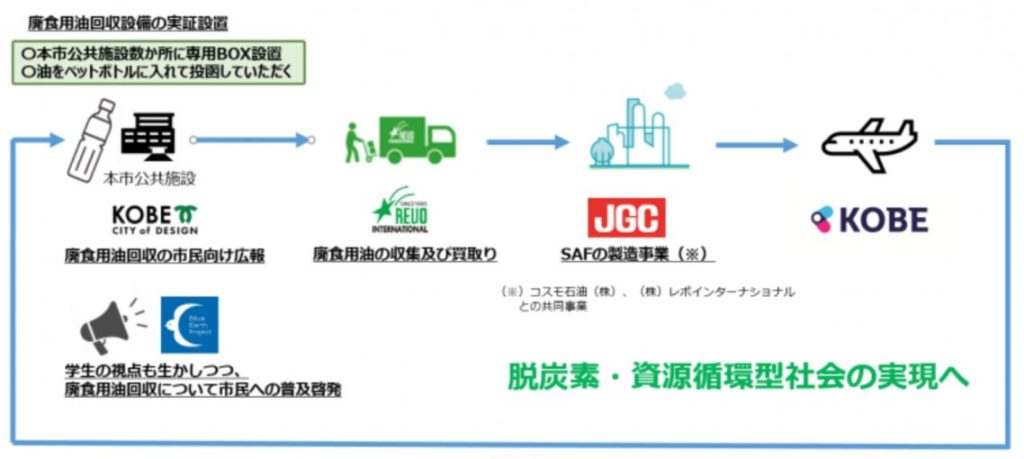Resource circulation by Social Bridge
Social Bridge has been operating a used-resource collection since Matsuzawa was founded in Kobe in 1953. We have been in business for approximately 70 years, deeply connecting with the local community. As a registered company by Kobe City, it aims to accelerate resource circulation through a variety of initiatives, including used-resource collection such as waste paper, metal scrap, and industrial wastes.
Our Journey to Resource Circulation vol.3 ~ Social Bridge’s Initiatives for used cooking oil~
Trends in waste cooking oil around the world
In recent years, as interest in environmental issues and the effective use of energy resources has increased, recycling of used cooking oil (UCO) has been attracting attention.

The global UCO market is expanding year by year. The market size is expected to reach approximately $6.6 billion in 2023, and grow to approximately $13.96 billion in 2032. Furthermore, the global supply of UCO in 2022 is estimated to be approximately 140 million tons.
UCO is mainly recycled into biodiesel, animal feed, soap, lubricating oil, etc., and has a potential to be one of the essential resources for building a recycling-oriented society.
The U.S.A
Approximately 32 million tons of UCO will be collected in the United States in 2022. The country has an approximately 42% share of the global UCO market, much of which is used as feedstock for biodiesel. Policies such as the Renewable Fuel Standard (RFS) and California’s Low Carbon Fuel Standard (LCFS) encourage the collection and reuse of UCOs.
The U.S. also has the most developed UCO collection network in the world, allowing for efficient collection of UCO from restaurants and food processors. The following shows the collection process by DAR PRO Solutions, a leading industry company that collects and recycles UCOs from commercial facilities throughout the United States. DAR provides safe and efficient UCO management solutions for restaurants and food processors.
Additionally, increasing demand as a feedstock for biofuels has increased the price of UCO, increasing incentives for collectors.
China
China is one of the countries where UCO recycling is progressing. In 2024, approximately 60% of UCO imported by the United States came from China. In addition to domestic consumption, the country actively exports to Europe and the U.S., making UCO a valuable trade resource.
As in the U.S. and Japan, efforts are being made to collect waste cooking oil from commercial facilities such as restaurants and food processors. Particularly in urban areas, local governments and private companies work with collection companies to provide regular collection services.
For example, Yum China conducted a pilot project in Sichuan province to recycle UCO into biodiesel.
UCO recycling process by Yum China
- Collection of waste cooking oil: Collect used cooking oil in special containers at KFC and Pizza Hut stores.
- Collection by collection agency: Our affiliated waste oil collection company regularly visits each store and collects used cooking oil.
- Processing into biodiesel: Collected waste cooking oil is recycled into biodiesel at a certified facility.
- Reuse: The biodiesel produced is reused as fuel for logistics vehicles and generators.
It is reported that through this project, approximately 5,700 tons of waste cooking oil will be converted to biodiesel by the end of 2024.
EU countries
Approximately 1.66 million tonnes of UCO are collected annually across the EU, the majority of which is used commercially, as in other countries.The top four EU countries with the highest amount of domestic used cooking oil (UCO) collected are as follows, accounting for 50% of the total amount of UCO collected in the EU.
- 1st: Spain
- Annual UCO collection amount: Approximately 420,000 tons
- There are many UCO collection companies in the country (e.g. Olio, Biocom Energía).
- Recovery from both households and industry is progressing.
- Collection infrastructure is being developed in cooperation with local governments.
- 2nd: Germany
- Annual UCO collection amount: Approximately 390,000 tons
- Large companies such as Saria Group collect through wide area networks.
- The main focus is on UCO collection from commercial and industrial sources, but household collection at the municipal level is also expanding.
- 3rd: Italy
- Annual UCO collection amount: Approximately 240,000 tons
- Led by companies that have established effective recovery processes, such as Sapi Green Oil.
- The proportion of collections from households is relatively high even within the EU.
- 4th: France
- Annual UCO recovery amount: Approximately 190,000 tons
- Collection is mainly done by restaurants and food processing companies.
- Although there are still issues with household collection, local governments have recently stepped up support measures.
For example, Sapi Green Oil has built a nationwide UCO collection network to efficiently collect and recycle waste oil from commercial facilities and households. First, UCO is collected from approximately 50,000 customers, including restaurants, hotels, schools, and municipalities.To those customers, it provides special collection containers (capacity 25 to 1000 liters) made of high-density polyethylene, allowing safe and sanitary storage of waste oil. Stored UCO is efficiently collected and processed using warehouses and processing facilities located throughout Italy. The recovered UCO is then recycled into biodiesel, soap, industrial products, and other products, contributing to a circular economy.
In this way, UCO is being recycled and turned into new energy and products, mainly in the developed countries mentioned above, with recovery processes in place. However, the majority of these are commercial UCOs, and collecting household UCOs is an issue in each country. In Japan, in addition to commercial UCOs, which are increasingly being collected and recycled, there is a need to build an efficient collection system for household UCOs.
Current status of UCO recycling in Japan
In Japan, there are no clear nationwide laws and regulations regarding the collection of UCO, but local governments and businesses are developing voluntary initiatives based on the Waste Management Law and the Resource Recycling Promotion Law. In particular, it is expected to be used as a raw material for sustainable aviation fuel (SAF), and national and local governments are promoting support and systems to promote its recovery. The followings are some initiatives for household UCO collection in Japan.
1. Household waste cooking oil collection by ENEOS in Tokyo and Chiba Prefecture
Since 2023, ENEOS has been collaborating with Seven & i Holdings to collect waste cooking oil from households at 13 grocery stores in Tokyo. Special returnable bottles will be distributed, and the collected oil is used as raw material for SAF. In 2025, demonstration experiments will begin in Chiba Prefecture, and in addition to supermarkets, convenience stores and large-scale condominiums will be collected.
2. Tokyo Metropolitan Government “Tokyo Fry to Fly Project”
The Tokyo Metropolitan Government is collaborating with Cosmo Oil, JGC Holdings, and Revo International to launch the “Tokyo Fry to Fly Project” a campaign to collect waste cooking oil from households as raw material for SAF. From June to August 2024, a demonstration experiment was conducted in which collection boxes were set up at gas stations in Tokyo, and citizens brought in used cooking oil in plastic bottles, etc., to be used in the production of SAF.
3. Kobe City concludes “Cooperative Agreement on the Promotion of Recovery of Used Cooking Oil for the Development of a Sustainable Society”
Kobe City has signed an agreement with JGC Holdings, Revo International, Kansai Airports Kobe, and others to promote the collection of UCO from households. Starting in the fall of 2024, special boxes will be installed at public facilities in the city and a demonstration will begin to utilize the collected oil as a raw material for SAF.

Initiatives in Kobe by Social Bridge
As mentioned in the column “Building a new supply chain using bio-based materials-2”, while the recycling of commercial UCO is progressing, the recycling of household UCO is only just beginning, and approximately 100,000 tons are still being incinerated. Social Bridge has focused on this household UCO and has begun working on creating a collection and recycling system starting in Kobe.
- Collection flow using Social Bridge
- Restaurant/Store: Store oil (after removing fried residue, store oil up to 80% of a can)
- Restaurant/Store: Contact Matsuzawa
- Matsuzawa: Collection
As mentioned above, in anticipation of the start of scheduled international flights at Kobe Airport around 2030, Kobe City considers the use of SAF (Sustainable Aviation Fuel) to be an effective approach toward achieving carbon neutrality in 2050. Following this trend in Kobe City, Social Bridge will continue to work on one aspect of this, particularly in order to build a value chain for household UCO recycling, which is still under development.

